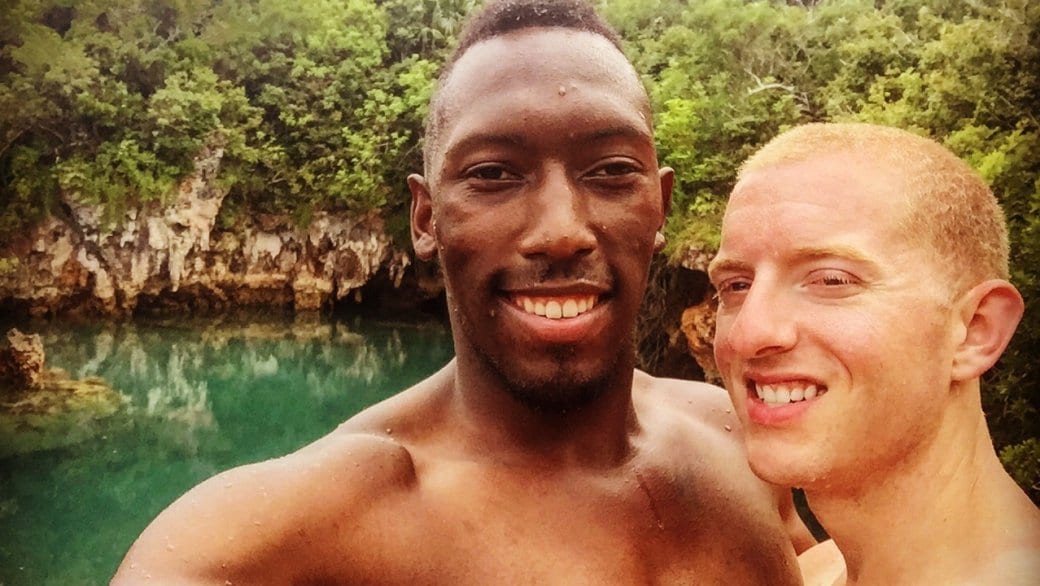Seven months ago, Winston Godwin and Greg DeRoche were celebrating their win, after Bermuda’s Supreme Court ruled that same-sex couples have the right to marry in the British territory.
Now their victory feels bittersweet. A new government has passed a bill that voids the court’s decision and relegates same-sex couples to domestic partnerships only.
Bermuda’s House of Assembly passed the Domestic Partnerships Bill by a vote of 24-10 on Dec 8, 2017. The Senate followed suit five days later in an 8-3 vote.
“It’s a difficult pill to swallow when you’ve got the majority of a government telling you that you don’t deserve to have the same rights as us simply because of who you choose to love,” Godwin says.
Godwin, who is from Bermuda, and his Canadian husband DeRoche are hoping the bill is only a temporary setback for the territory’s LGBT community.
“I hope that Greg and I have inspired others in the community to fight for what they believe in,” Godwin says, adding that he hopes the government of Bermuda will support same-sex marriage again soon.
“I think it takes leadership, it takes courage to fight and stand up for all people and affect change,” he says.
The US-based Human Rights Campaign has called for Bermuda’s UK-appointed Governor John Rankin to withhold his signature from the repeal bill, which would veto the legislation. But it appears unlikely that the governor will block the bill.
“If Governor Rankin signs this measure into law, it will rip away the right of loving same-sex couples in Bermuda to marry. That’s unconscionable,” says Ty Cobb, director of HRC Global, in a press release.
“With international business and tourism as its major industries, Bermuda’s people, international reputation, and economy would all be harmed by this legislation,” Cobb continues. “It is crucial that Governor Rankin reject this assault on equality.”
The new law leaves in place an estimated seven same-sex marriages that were conducted in Bermuda since the court’s May 5, 2017, ruling in favour. It also allows the government to continue recognizing same-sex marriages that Bermudians entered into overseas before the bill passed.
In place of marriages, same-sex couples can now get “domestic partnerships,” which the government claims will have all the same benefits of marriage, but without the word “marriage.” Notably, same-sex couples continue to have the right to adopt, as per a previous Supreme Court ruling from 2015. Domestic partnerships will also be open to heterosexual couples.
OUTBermuda, the territory’s LGBT advocacy group, said in a statement on its Facebook page that it is “disappointed” with the government’s actions.
“The challenge for OUTBermuda and all allies is to engage proactively with the wider community to provide a balance to the misinformed and often bigoted rhetoric, on this and many other issues facing the LGBTQ community,” the statement says.
“As we made clear to the Government, we did not believe the Consultation period was long or thorough enough,” it adds.
“If this bill had come forward a year ago, we would have been delighted, because everyone in the gay community and advocacy community would have seen this as a huge step forward,” notes Rod Attride-Stirling, the lawyer who represented the Human Rights Commission in the Godwin-DeRoche case.
“This gives all the rights, save the word marriage,” he says. “The problem is that it’s a step backward, because it’s taking away something that’s pretty fundamental. Though it’s just a word, it matters.”
LGBT rights have evolved rapidly on the small island of approximately 64,000 people. Sexual orientation was added as a protected characteristic under the territory’s Human Rights Act in 2013. That led to successive court cases that recognized same-sex couples for immigration and adoption purposes.
The previous government held a referendum last year asking citizens if they approved of civil unions and same-sex marriage. Both options were rejected by about two-thirds of voters, but the referendum failed on low turnout.
The Supreme Court decision for same-sex marriage had implications beyond the territory’s small LGBT community. Cruise ships registered in Bermuda, including Princess, P & O, and Cunard, were planning to offer same-sex wedding packages to a global clientele. That option is now closed.
Kevin Dallas, the CEO of the Bermuda Tourism Authority, had lobbied senators to block the bill, citing its potential negative impact on tourism.
“Same-sex marriage is already the law of our island and to roll that back for what will be seen as a less equal union will cause us serious reputational damage. We are convinced it will result in lost tourism business for Bermuda,” Dallas wrote in a letter that was released to the Royal Gazette newspaper.
LGBT couples have differing legal rights across the UK and its various territories. In the UK proper, same-sex marriage is permitted in England, Scotland, and Wales, but not in Northern Ireland. Among Crown Dependencies, same-sex marriage is legal or soon to be legal in Isle of Man, Guernsey, and Alderney, but not Sark, or Jersey, where the legislature is set to vote for an equal marriage law next January.
Among British Overseas Territories, same-sex marriage is legal in the Falkland Islands, Gibraltar, Pitcairn Islands, Ascension Island, Tristan da Cunha, British Antarctica, and in the UK military bases Akrotiri and Dhekelia and the British Indian Ocean Territory. St Helena’s legislature is expected to vote for a same-sex marriage law on Dec 19, 2017. Same-sex couples do not have statutory rights in the Cayman Islands, British Virgin Islands, Turks and Caicos, Montserrat, Anguilla, and South Georgia and the South Sandwich Islands.
No country that has begun performing legal same-sex marriages has since banned them. Slovenia’s government legalized same-sex marriages in 2015, but a citizen-initiated referendum banned them before the law took effect.


 Why you can trust Xtra
Why you can trust Xtra


